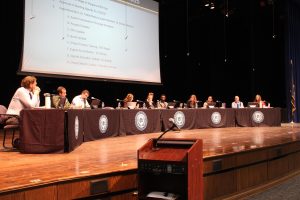Project based exams offer a rare compromise
January 7, 2022

Traditionally, midterms have always been multiple choice tests. Traditionally, students would get a week away from their regularly scheduled learning to partake in two 90-minute tests a day. Traditionally, students are in school, unmasked and lived in a time where COVID-19 did not exist.
Grosse Pointe South High School is full of tradition and things that don’t change. Things that have changed are the curriculum, the teachers and the students. The things that need to change are how students take end of semester tests, that are 20 percent of their final grade. The last regular midterm was taken in the 2019-2020 school year, and it is time for the school district to make another change. We have gone two years without the high schools holding end of term exams, which have had little impact on grades. In that time, students had lost countless hours of learning, which justified not holding exams based on a count of students’ learning not being reflected in their final grade.
What is the difference between this year and years prior? Due to the surge of the new COVID-19 Omicron variant, students are missing weeks of school due to the school’s commitment to 100 percent face-to-face learning. They are falling behind their peers at a very crucial time of year, and without the use of Zoom, this will likely continue. Members of the community who don’t experience the day-to-day struggles that take place in our school wouldn’t know how important the time is between the end of winter break and the start of midterms. Most of this time is used by teachers to wrap up their lesson plans and get back on track, which typically means piles of work for students who are trying to finish the semester strong. This also includes an important week of extensive review in preparation for the midterm.
There is a simple solution to this seemingly complex problem; project based exams.
Switching to a project based midterm exam allows for flexible deadlines, more collaboration and the possibility for students to complete their work regardless of whether they are at home or in school.
Some electives at South are already partaking in this, for example Mrs. Rothenbuhler’s Zoology class is tasked with creating a project that goes further in depth on topics that they’ve learned previously in class. As someone in that class, I believe that it has led to better retention of what I’ve learned, and application to the real world as well as being an enjoyable experience for me.
Other teachers that have alternative midterms, include the English department, which typically have their students do a project or write an essay and have the reflection graded.
Though project based midterm exams are an option already being used for certain classes, there are other solutions besides taking a 90-minute exam to fill the 20 percent void on each student’s grades that show the students understanding of the class.
Even if a student were to have 4 or 5 projects and 1 or 2 multiple choice tests, that would be exponentially better than someone having 7 multiple choice tests.
I encourage students, parents and faculty members to reach out to administrators and the school board in support of project based or other alternative midterms. Nothing has ever been done without compromise, and this might just be the solution to these untraditional circumstances.














































































